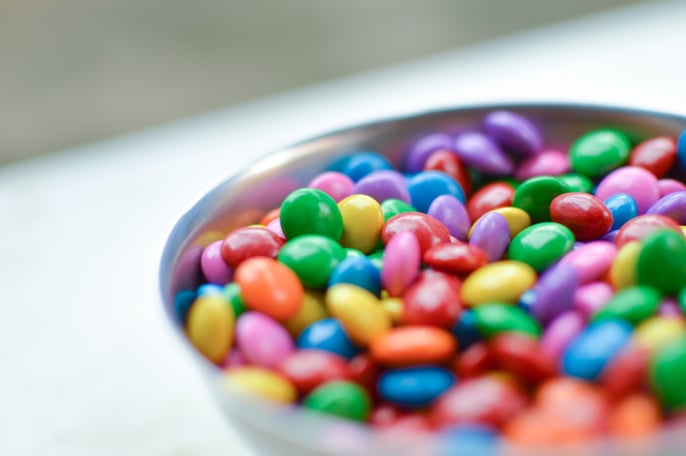
Halloween usually means plenty of fun, dressing up and socializing. People are out on the streets, and there’s a special holiday atmosphere. But along with pumpkins and face paint, there’s a real threat to migraine sufferers: candy.
Even people who don’t eat much candy are tempted to indulge when there is so much around. For many, kids and adults alike, it just wouldn’t be Halloween without those favorite trick or treat nibbles.
Migraine and Candy Links
If you get a spike in migraine frequency or severity around Halloween time, you could be forgiven for thinking it’s because of all the time spent outdoors in chilly weather, or the extra hours working to prepare costumes or porch decorations. All that could be true, but another reason could be because you’re eating more sugar than you normally do.
Migraineurs who totally understand their pain and trigger patterns may have identified a link between eating sugar and a migraine episode. For others, maybe those who have never kept a migraine diary or those recently diagnosed, the links between sugar and migraine may come as a surprise.
It’s not just Halloween, of course, since other times of year when we habitually overdose on the sweet stuff are equally risky. Easter and Christmas are prime examples, but you could add in birthday celebrations or vacations, or any time when we ditch our usual habits and let our hair down.
Why Sugar Can Cause Migraine
Sugar in the form of glucose, which we also get from carbohydrates, is an important part of our diet. From this sugar we get the energy for all the normal functions the body and it’s organs carry out. The brain needs sugar as much as any other organ and is one of the first affected if glucose levels drop.
Because levels of glucose in the body constantly fluctuate as we use up stores and eat more, we have a nifty inbuilt regulating mechanism in the form of fast acting hormones: insulin and glucagon. When blood sugar gets too high, we produce insulin to bring levels down, and when glucose levels drop another hormone called glucagon works to bring them back up again.
Having low blood sugar levels can lead to a condition called hypoglycemia, and it’s responsible for triggering migraine headaches. Hypoglycemia symptoms can include:
- Headaches
- Confusion
- Feeling faint
- Sweating
- Nausea
- Ordinary headaches
- Hypothermia
In extreme cases, it can even be fatal, but this is very rare.
Migraineurs know skipping meals or rigorous dieting can trigger an attack. What many don’t know is that the condition known as hypoglycemia could be responsible. This is because fasting, dieting or skipping meals all cause fluctuations in blood sugar levels, particularly low levels.
Some of the symptoms of hypoglycemia (listed above) are also warning signs of an impending migraine, along with yawning and mood changes. Mood swings, interestingly, also often precede a craving for sugar.
Avoiding Halloween Migraines
Does this mean you can’t enjoy trick or treat at Halloween any more? Not necessarily. Unless you know certain sweet foods, such as chocolate, are a personal flash point for pain, then moderation is the keyword.
When you eat too much sugary food too quickly, you cause a spike in blood sugar levels. This prompts a release of insulin, which in turn causes a blood sugar dip. The roller coaster rise and fall is what leads to headaches and other symptoms.
Not all sugars are equal. Some sweet, natural foods, such as carrots or apples, taste sweet because they contain sugars. Other foods, such as white bread or pasta, also contain sugar. The difference is the speed at which the body is able to process those different sugars, adding them to the bloodstream. Sugar from carbohydrate food is processed quickly, whereas sugar from foods like carrots is processed slowly so doesn’t cause the damaging spike.
Some migraineurs find they can eat refined sugar in moderation and not suffer any ill effects, while others experience a cumulative effect if they eat large amounts of sugar over several days. Limiting the amount of refined sugar in your diet could help you keep migraines more under control.
Go for foods like natural fruits, beets and carrots or sweet peppers, all of which are high in complex sugars that take a while to process and so don’t cause the sugar spike. If you satisfy most of your sugar needs in this way, your body may cope better with the odd refined sugar treat. The bonus is that refined sugar is highly addictive, so eating less of it usually means we actually want less.
Eating too much Halloween candy may trigger a migraine, but if you understand your limits and realize what sugar is doing inside your body, you’re able to compensate and still enjoy the season and the occasional treat.

